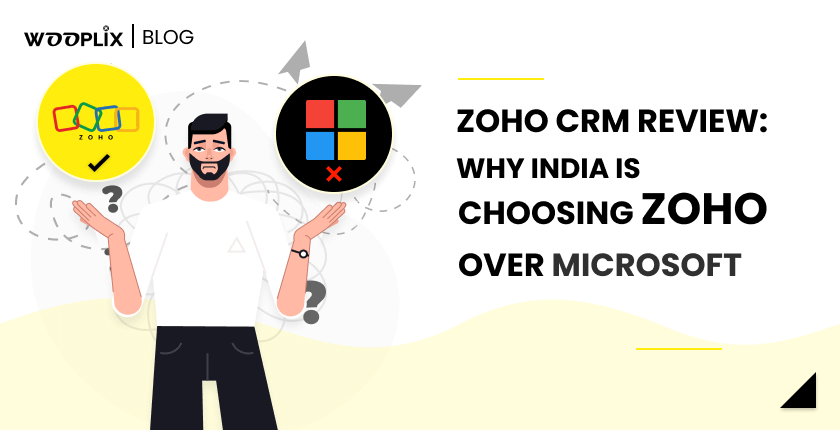Operating a business in India today involves more than just producing a product or delivering a service. You need to manage leads, track sales calls and emails, read reports—and you still have to keep up with changing market dynamics, regulations, and digital needs. With no system in place important information falls through the cracks, chance opportunities are missed, and growth becomes more challenging, and for these reasons CRM or Customer Relationship Management software has become an important tool for many companies in India regardless of their size.
One product that continues to surface at the top of many lists in India is Zoho CRM. Though the likes of Microsoft Dynamics 365 remain popular, many Indian companies are beginning to lean toward the adoption of Zoho CRM. In this review we will determine why Zoho is becoming more popular in India, what it does, how it works, and if it is a better choice for your company.

What is Zoho CRM?
Zoho CRM is a cloud-based CRM system created by Zoho Corporation (an India-founded company) to bring all customer-related work (sales, marketing, support) into one integrated program. Zoho CRM helps businesses of all sizes to manage their leads, contacts, deals and service requests from one place with a smart workflow, more visibility into the customer journey and built in automation.
The vendor’s claim states 300% improvement in lead conversion rates, 41% more revenue per salesperson, and 24% decreased sales cycle times—when used correctly. Given its Indian company lineage, its affordability, its scalability and high usability, Zoho CRM seems increasingly attractive to Indian businesses that do not want to over-invest in a large enterprise system too early.
Why India is Selecting Zoho CRM Instead of Microsoft
More Cost-effective for businesses in India
One of the most powerful points of evidence in favour of Zoho CRM is pricing. The cost of Zoho CRM is exceptionally lower every time you compare it to Microsoft Dynamics, especially for small and medium-sized enterprises. The lower Total Cost of Ownership (TCO) works favourably for India’s cost-sensitive yet growth-concerned business landscape. Zoho CRM promotes itself as “pay for what you need,” with lower complexity around tiers and fewer covert add-ons. In comparison, Microsoft Dynamics will often develop significant cost to licensing, consulting and integration before you can interface similar features.
More Aligned to Indian Market
Zoho Corporation has an Indian‐head start and has directs its efforts to the Indian market. The features, support, localization and pricing are adjusted to India’s business context. In a fledgling culture with many start-ups, mid-sized businesses, and organizations that are price-sensitive, this makes a considerable difference.
While Microsoft strategy’s promote scale, Zoho strategy’s strength is allowing flexibility to address regional needs. Zoho’s comparatively lower pricing structures are also a considerable factor. Indian firms feel value in supporting a home-grown India-based provider rather than just gravitating to another large global organization.
User-Friendly and Rapid Implementation
Zoho CRM maintains a comparably shallow learning curve. Companies have found that it leads to a development and onboarding phase which is more straightforward and faster as compared to larger enterprise offerings, such as Dynamics.
One Indian marketing company, for instance, found that moving from Microsoft Dynamics to Zoho CRM dropped the implementation period from two months to the development process over two weeks and freed up the sales team from pipeline management responsibilities. For many Indian organizations, this simplicity and rapid implementation was definitively more important than heavyweight enterprise features that they would not yet leverage.
Ecosystem Approach within a Business Suite
Zoho CRM as part of a wider Zoho suite of business applications (books, campaigns, desk, projects), which makes it more straightforward for Indian businesses to run multiple business processes, all while reducing vendor churn.
Microsoft has a strong ecosystem as well, but for many small and medium-sized Indian companies, the price and complexity of fully using the Microsoft stack (Dynamics + Power Platform + Azure + Office) runs the risk of getting too heavy. Zoho offers a more concentrated solution that is integrated, but all contained.
Key Features of Zoho CRM
Below is a look at what are some of the key differentiators for Zoho CRM — specifically in the Indian context:
Lead & Contact Management
Zoho CRM gives access to capture leads through websites forms, email, chat, or social media and categorize them into one expansive system. Each lead and contact will have a history of communications, transactions, and interactions along with circled notes. This creates a better follow-up cycle, along with a stronger relationship with the sales team.
Sales Automation
You can automate the process between repetitive tasks such as assigning a lead to a rep, certain emails like a welcome email, scheduling follow-ups, or any changes in a deal’s status, etc. By reducing repetitive behavior, your sales team will focus on closing deals, rather than being an administrator.
Omnichannel Communication
Zoho CRM allows you to have communication whether it is through email, phone, live chat, or social media channels inside the same application. You never lose messages switching back and forth on apps. This may seem superficial but ensuring the conversations are followed up and the customer is accessing through a platform of their choice will ensure a return on your investment.
Analytics & Reporting
Zoho will allow you to create your dashboards and reports that can be customized to track questions you have about your business. Questions like how many leads came in? How many closed? Who closed the most? Through integrations like Zoho Analytics you can analyze past events, attempt forecasting, and make data entries.
Workflow Automation & AI (Zia)
Zoho CRM allows workflow rules for automatic actions based on triggers (emails sent, manager alerted) when certain triggers occurred (deal closes, lead too idle). In addition, Zoho’s AI assistant “Zia” will suggest the best time to contact a lead, analyze emails, predict the likelihood of closing a deal and flag inconsistencies.
Integrations
Zoho CRM has integrations with Outlook, Gmail, Slack, QuickBooks, Shopify and many other integrations including others in the Zoho family, such as Zoho books (accounting system) and Zoho Desk (support system). Connecting multiple systems is extremely important for any growing business in India.
Mobile App & Offline Capability
With India’s mobile-first workforce, the Zoho CRM mobile app is a significant benefit for the software. The mobile app will allow its customer to view leads, update deals, call leads and run reports on the go from their phone, making it useful for all of Zoho’s customers. The customer can even operate offline as everything will automatically sync when going back online.
A Comparison of Zoho CRM and Microsoft Dynamics 365
The differences between Zoho CRM and Microsoft Dynamics 365 become clear, especially when addressing the Indian business ecosystem.
Features vs Complexity
Dynamics 365 might provide a more sophisticated set of features (territory management, advanced forecasting, account-based marketing, full and native integration with the Power Platform), but it can frequently be more complex and more expensive.
Zoho CRM can hit the sweet spot: it has sufficient features for nearly all sales, marketing, and support processes — but with a simpler setup and virtually zero overhead. For many Indian businesses, that is probably all they require.
Cost & Value
When examined per user/month and comparing similar scenarios, vendor data shows the cost of Zoho CRM Enterprise is much lower than Microsoft Dynamics 365 Sales Enterprise. This has enabled smaller businesses to invest in a good CRM features before their beginning cash reserves run out in an overly expensive system.
Deployment & Support
Overall feedback indicates that Zoho CRM can be running faster and with less IT overhead than Dynamics. Please note that some users note the responsiveness and attentiveness of Zoho support varies, and some support plans may require a premium. Microsoft provides very good support; however, the inherent complexity of the system may increase implementation and maintenance costs quickly.
Advantages of Using Zoho CRM for Indian Businesses
Budget-Friendly: More affordable in terms of monthly license costs, and less hidden costs which make it manageable for SMEs or startups.
Speed of Implementation: When it comes to onboarding, it is fairly easy, along with an overall intuitive nature the ramp up time is reduced.
Scalable: You can start small and scale. Zoho CRM can allow you to add users, workflows, and integrations along the way.
Unified Platform: Many companies have been able to minimize tool-sprawl and vendor fatigue, by using the broader Zoho suite (books, campaigns, desk, etc).
AI-Enabled Sales: Integrated automation and AI (Zia), there is less to be purchased and teams receive some helpful assistance in decision making.
Mobile Ready: Useful for field sales teams, regional offices, and the nature of working on-the-go.
Final Verdict
In conclusion, after all the touchpoints, feature comparisons, and deliberation within the Indian business context, Zoho CRM’s growing popularity among Indian companies, in particular companies looking to try and do CRM on a budget, becomes clearer. For the vast majority of Indian companies—particularly startups, small- to medium-sized businesses, or companies looking for something that offers value at a reasonable price—Zoho’s CRM package delivers the right amount of price, functionality, and flexibility. Zoho’s origins, local support, and relevance to Indian business practices simply add to this already compelling value proposition.
It may not deliver all the highest-level enterprise features of Microsoft Dynamics 365, but for most organisations in India today, it delivers more than enough to manage leads, manage sales pipelines, automate processes and tasks, integrate into business processes, and ultimately grow a business. With its suite of apps, mobile-first approach, and built-in AI technology, Zoho CRM is definitely going to be around for the long haul. If you are looking for CRM software that brings your customer data to a single helpfully structured database, manages your deals, improves productivity within your teams, and keeps costs manageable—Zoho CRM will likely be a good option for you to consider.
Conclusion
Zoho CRM is an excellent choice for Indian businesses seeking a powerful yet affordable CRM solution. It ticks the boxes of usability, local relevance, integration and scalability. Whether you’re a small team just starting out or a mid-sized business aiming to scale, Zoho CRM offers a smart, practical path forward.
If you are ready to simplify your customer management systems, automate your workflows and provide your sales and marketing teams with new tools, learn how Zoho CRM might fit into your organisation as the next stage in your growth. Visit wooplix.com to learn more and how it can help to enhance your own growth and efficiency.

